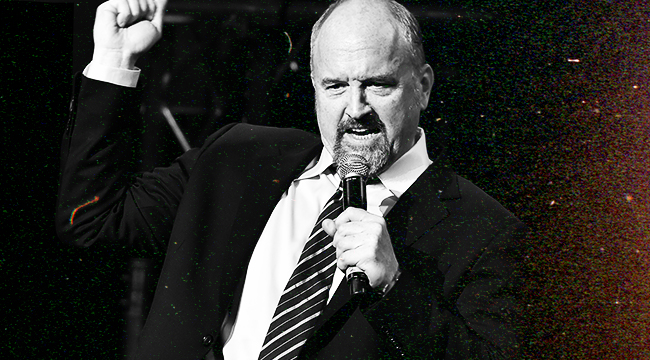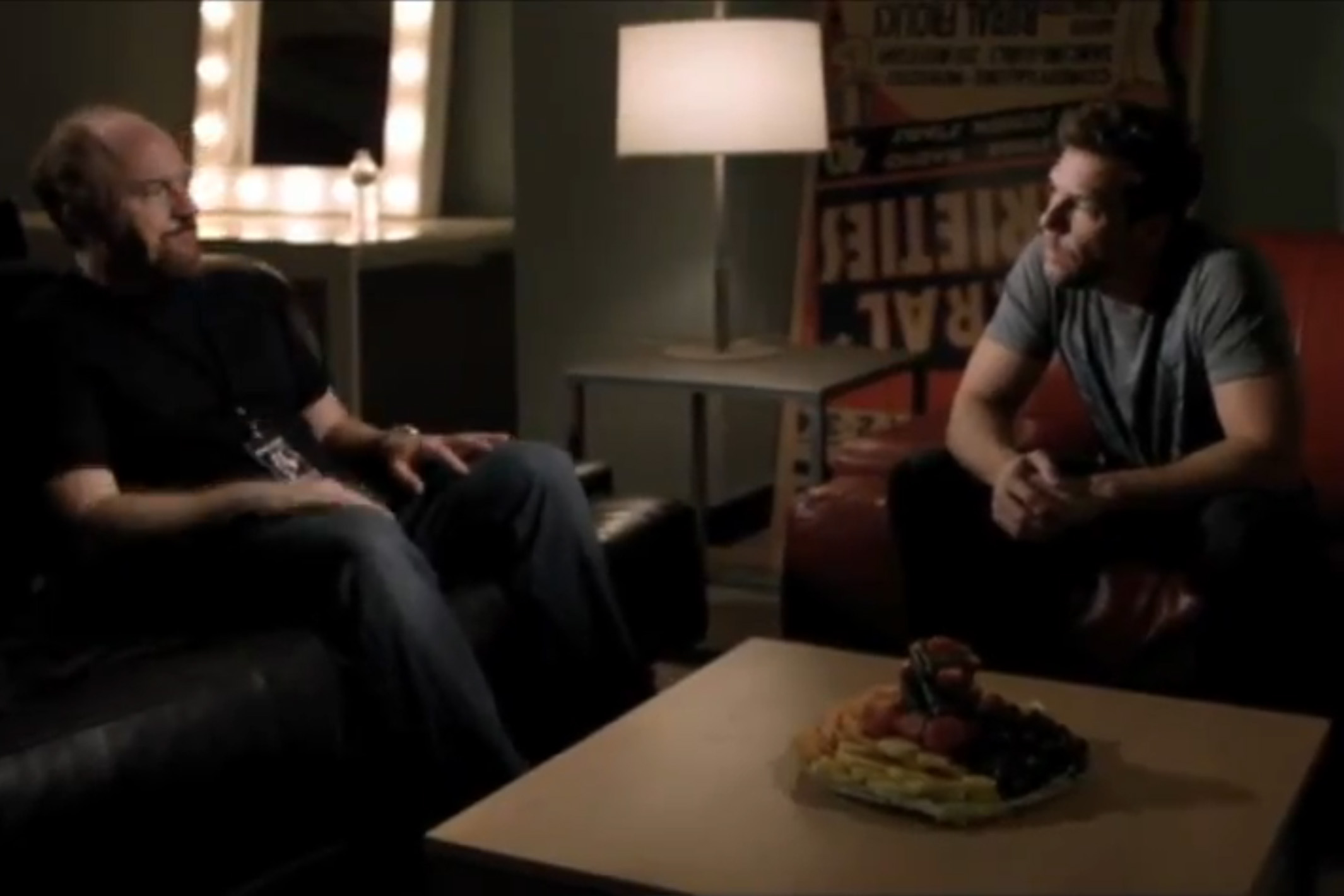
By now you’ve likely heard or read about a recent comedy set performed by Louis C.K. in which he mocked survivors of the Parkland shooting, language used to describe transgender non-gender conforming people, and the sexual proclivities of Asian and African-American men. Since the news broke last weekend, C.K. has been roundly condemned for his insensitivity and wanton hackiness, as well as (inevitably) defended by self-appointed First Amendment watchdogs on the far-right who somehow equate calling out unfunny, bigoted jokes with government infringement on free speech.
Even for a former fan, it’s difficult at this point to be shocked by anything Louis C.K. says or does. He has thoroughly disgraced himself in the past year and a half, and done nothing to make amends. However, this latest controversy is different in that it concerns C.K.’s comedic sins. Ridiculing those who deserve it the least, with zero wit or insight, seemingly for no reason other than to play to the ignorance of the audience, is the very essence of bad comedy. And C.K., no matter what you thought of him as a person before last weekend, is supposed to signify the opposite of bad comedy. C.K.’s latest material is a stunning abdication of his previous role — as appointed by an adoring media and many of his peers — as the Pope of stand-up, the living embodiment of comedy’s conscience.
If that sounds like hyperbole, I encourage you to revisit the seventh installment of Louie‘s second season, the famous Dane Cook episode. Or, if you understandably recoil at paying to see anything with Louis C.K.’s name on it, you could just watch the YouTube clip below, which captures much of the episode’s most memorable scene.
The episode, like many episodes of Louie, generated a lot of conversation back in 2011. If you remember, Louis visits Dane at the arena he’s headlining that night in order to ask for Lady Gaga tickets, which he intends to give to his young daughter as a birthday gift. But Louis knows those tickets will be a hard get, because the two have history: Years earlier, Louis accused Dane of stealing three jokes, a capital crime (at least in terms of credibility) in the comedy world.
Of course, this wasn’t just a sitcom contrivance: C.K. and Cook really did have bad blood stemming from supposedly pilfered bits that appeared on Cook’s hit 2005 album Retaliation. (The jokes, which include the self-explanatory “Itchy Asshole,” were said to have originated on C.K.’s 2001 album Live In Houston.) At the time, people focused on Cook and his apparent acknowledgment of these transgressions. In the Louie episode, Cook defiantly argues against the joke-thief accusations, and angrily calls out C.K.’s role in perpetuating them. But the mere act of appearing on Louie was interpreted as an act of contrition, betraying Cook’s eagerness to ingratiate himself with his former tormenter and, perhaps, gain some favor with his hip, discerning audience.

I was part of that self-regarding audience. “When it comes to recovering lost credibility in pop culture, nothing beats that kind of self-awareness,” I wrote, with an implied arched eyebrow, back then. “It’s the closest thing to a magic bullet, or in Cook’s case, a ‘get out of jail’ card.” Little did I know in 2011 that C.K. himself had already committed crimes a good deal more serious than taking someone else’s jokes — so serious that he could’ve ended up in actual jail.
Watching that Louie episode now, clearly, is a much different experience. For starters, almost nothing about it is self-aware at all. Cook was not speaking his own words; C.K. insisted that Cook stick to the letter of the script that C.K. wrote, even threatening to hire another actor to play Dane Cook if he resisted. While the dialogue C.K. wrote for Cook likely aligned with some of what Cook felt about C.K.’s role in tarnishing his reputation, C.K. ultimately is not overly concerned with exploring Cook’s point of view, much less absolving him. While Cook does come off sympathetically on Louie, that seems coincidental, even accidental. The audience is always meant to side solidly with the “benevolent” Louis C.K., and see the more obviously flawed Dane Cook from C.K.’s perspective.
When C.K. asks Cook for the Gaga tickets, Cook agrees to do it — on the condition that C.K. go on YouTube and tell the world that Cook didn’t steal his jokes. In the self-serving world of Louie, which was solely created and controlled by Louis C.K., C.K. is a thoughtful everyman who has the power to redeem this bro-y, superstar philistine. (At one point, C.K. churlishly corrects Cook for saying “2000 and 6,” instead of “2006.”)
When the episode originally aired in 2011, many viewed it as C.K. kindly letting Cook off the hook, an equivalent to the YouTube plea that the fictionalized Cook demands. But it’s still implied that Cook, at best, unknowingly stole C.K.’s jokes, while being a lamentable (if benign) douchebag not worthy of genuine respect. In the end, Louis C.K., the writer/director/creator of Louie, affirms the superiority of Louis C.K., the stand-up comic, over Dane Cook.
Whether Cook actually deserved to be depicted as a douche and a comedy criminal in an old Louie episode is beside the point. What matters is that we now know Louis C.K. lorded his power over both female comedians in private and male comedians in public. And it’s the abuse of his status that remains at the crux of whether Louis C.K. should be allowed a comeback because it transforms terrible one-to-one offenses into an industry-wide disaster.
Seriously: How quaint does joke-stealing seem in comparison? The whole time that C.K. wrote, filmed, and then released an episode in which he explored the sins of a fellow comedian accused of hurting other comedians, he himself was hurting his peers in far more profound ways — first by violating them sexually, and then by allowing his victims to feel professionally threatened against speaking out publicly. Cook was despised for hurting somebody else’s livelihood; C.K. flat-out robbed people of their agency.
But the facade that Louie protected was already crumbling when this episode aired. The corroborated accounts of five women who claimed C.K. masturbated in front of them, later reported by the New York Times, date from the mid-’90s to 2005 — well before Louie or even Cook’s alleged thieving. Rumors about C.K.’s behavior had already been circulating in the comedy community of years, finally reaching the public via a blind item published by Gawker about six months after the second season of Louie concluded.
(Here is a very curious moment: When Cook refers to C.K. as a “good guy,” he does a jerk-off motion. Was this improvised, or did C.K. tell Cook to do that? Was it meant to be an irreverent gesture, or was it a subliminal confession?)

If C.K had demonstrated actual self-awareness on Louie, he would’ve saved the most soul-searching dialogue for himself. When Cook talks about how, at the peak of his success, he felt dogged by the rumors that C.K. refused to dispel, C.K. could’ve replied, “Well, I couldn’t defend you because I had too much to hide in my own life. Allowing people to hate you distracted comedy fans and the media from my own, much more serious misbehavior. You were a convenient pawn for me then, as you are now.”
It’s not too late for C.K. to finally exhibit some honesty in his stand-up act. Instead of picking on teen victims and marginalized communities, he could turn inward and address his own demons honestly and without the ulterior motive of bolstering his own reputation at the expense of others. By now, he should be all out of pawns.






